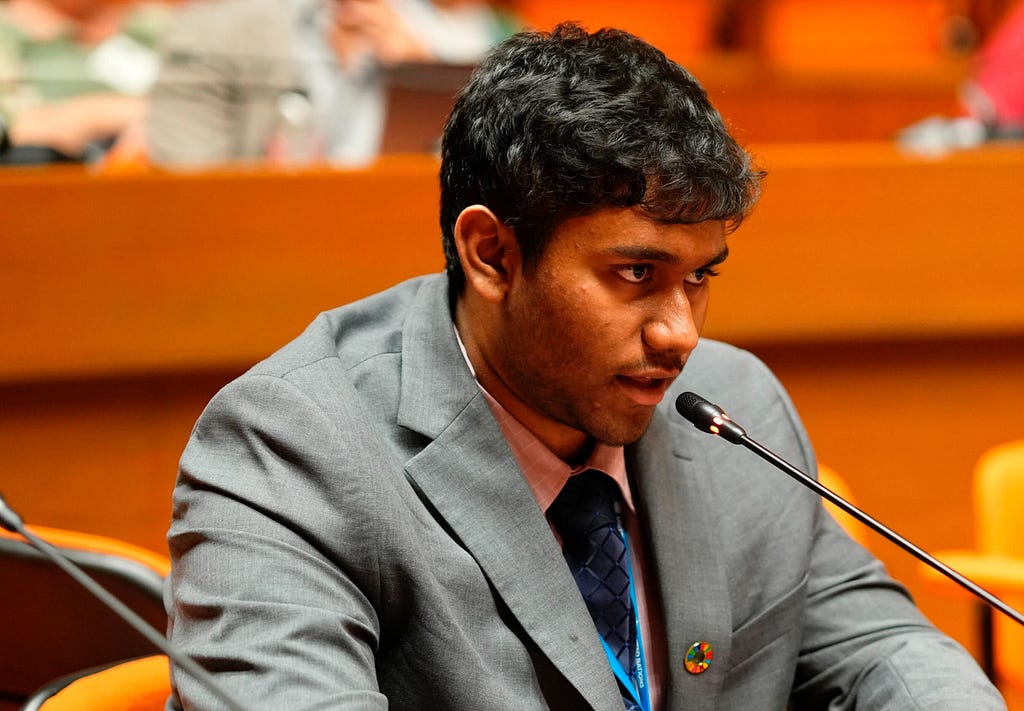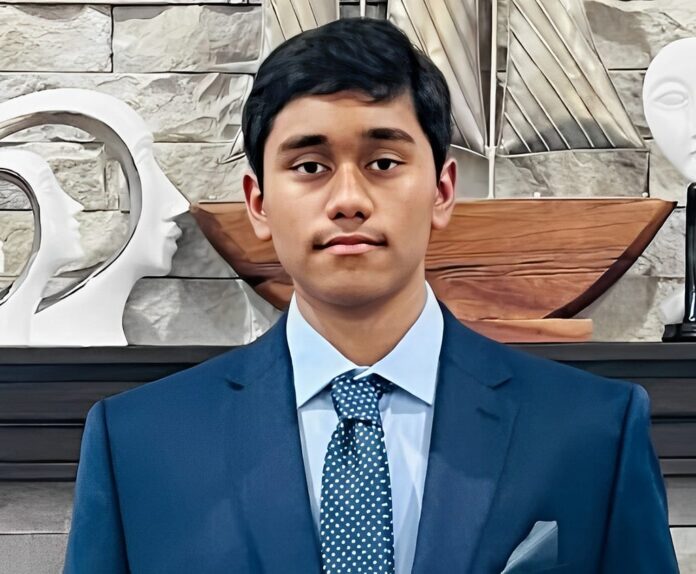Social Impact Heroes: Why & How Khartik Uppalapati of RareGen Youth Network Is Helping To Change Our World
An Interview With Stanley Bronstein
Leadership isn’t about having all the answers, it’s about building tables where questions are welcome. When we submitted our feedback to the EU Digital Services Act, I didn’t pretend to be the smartest person in the room. I listened to my peers, researchers, patients, designers, and assembled a youth task force. Together, we created a submission that advocated for patient data protections in ways even the adults hadn’t considered. That’s the kind of leadership that lasts,collective, humble, and radically inclusive.
As part of my series about “individuals and organizations making an important social impact”, I had the pleasure of interviewing Khartik Uppalapati.
Khartik Uppalapati is a 16-year-old biomedical researcher, global health advocate, and the founder of RareGen Youth Network, a youth-led nonprofit at the intersection of rare disease policy, artificial intelligence, and equitable healthcare reform. Diagnosed with arteriovenous malformation and a rare lymphatic disorder, Khartik turned his own medical journey into a catalyst for global change, influencing EU law, U.S. legislation, and grassroots youth movements worldwide. His interdisciplinary work spans AI-powered neurotechnology, machine learning-based drug discovery, and youth-led policy submissions that have reached the United Nations, European Commission, and U.S. Congress.
Thank you so much for joining us in this interview series! Can you tell us a story about what brought you to this specific career path?
I was twelve years old, lying in a hospital bed after yet another complicated procedure for my rare condition. The room was quiet, but I had so many thoughts and questions in my mind, no one seemed to have answers for. I had waited months for a diagnosis, received conflicting opinions from specialists, and watched my family search for hope in a system that often felt like it wasn’t built for people like us. I turned to my mom and asked, “With all the breakthroughs in medicine and technology today, why does it still take so long for someone like me to receive an accurate diagnosis and be truly heard?” That moment never left me. It became the fire behind every research project I pursued, every letter I wrote to lawmakers, and every young patient I spoke with who felt invisible. I didn’t see anyone my age, from my background, represented in those conversations about care, policy, or innovation. So I stepped into that space, not just to take up room, but to make room for others. That is the heartbeat of RareGen.
Can you share the most interesting story that happened to you since you began leading your company or organization?
In 2024, I stood at the United Nations Summit in Bangkok, presenting policy recommendations on disability-inclusive labor reform to global leaders and diplomats. As I spoke about equity and human rights, my phone buzzed with a reminder from my biology teacher about an overdue assignment. That contrast wasn’t just surreal, it was defining. It reminded me that young people living with rare diseases, like me, don’t have to wait to grow up to make an impact. We are not the leaders of tomorrow. We are already showing up, speaking out, and rewriting the future today. We don’t just deserve a seat at the table. We are helping build the table.
It has been said that our mistakes can be our greatest teachers. Can you share a story about the funniest mistake you made when you were first starting? Can you tell us what lesson you learned from that?
When I first started RareGen, I was balancing high-stakes meetings with global health leaders and the not-so-glamorous reality of being a student, all from the same laptop connected to multiple monitors. During one virtual policy presentation, I had to quickly share my screen. In the rush, I accidentally shared the wrong monitor, which happened to be running an active Roblox session.
These meetings could go on for hours, and playing Roblox was my quirky way of staying alert while keeping an ear on the conversation. For a few seconds, the entire room of seasoned professionals, including international regulators got a glimpse of my blocky alter-ego scaling digital towers.
To my surprise, it didn’t derail the conversation. In fact, it sparked some unexpected laughter and curiosity about how young people are blending work, play, and leadership in today’s world.
What I learned that day was this: professionalism matters. But just as important is being human. Authenticity creates space for connection, and sometimes it’s our imperfections that make us most relatable.
Can you describe how you or your organization is making a significant social impact?
RareGen Youth Network is not just an organization, it is a movement born from lived experience, driven by youth, and built to reshape the future for those living with rare diseases. We are tackling systemic barriers through three powerful pillars: cutting-edge research led by young scientists, transformative global policy advocacy, and a relentless pursuit of racial equity in rare disease care. In just one year, we’ve impacted over 500 families around the world, submitted seven comprehensive policy proposals to the European Union, and played a vital role in advancing the Health Equity for Youth with Disabilities Act in the United States. What sets RareGen apart is that every voice behind our mission belongs to a young person who has felt overlooked, misdiagnosed, or unheard. We are teenagers building patient data registries, shaping international law, and taking the microphone in rooms where decisions are made. We are proving, every single day, that the power to create lasting change doesn’t come with age, it comes with urgency, empathy, and lived truth.
Can you tell us a story about a particular individual who was impacted or helped by your cause?
In Bangalore, we supported a 13-year-old girl with a rare neuromuscular disorder whose family had never received a proper diagnosis due to socioeconomic barriers. Through RareGen’s BIPOC Patient Advocacy Accelerator, we connected her to a telehealth specialist, translated her symptoms into structured case data, and helped her family secure subsidized gene therapy support. Months later, her mom sent us a note saying, “You didn’t just help her medically, you gave us hope.” That’s why we do what we do.
Are there three things the community/society/politicians can do to help you address the root of the problem you are trying to solve?
1. Elevate the voices of young patient-advocates from passive stories to policy architects.
Support youth not just as storytellers but as solution-builders. Fund their research, include them in policymaking, and trust them to lead the future of rare disease innovation.
2. Make race, diagnosis, and access visible in the same dataset.
Without race-based data in rare disease reporting, systemic disparities remain hidden. Mandating disaggregated data is the first step toward meaningful, measurable equity.
3. Treat diagnostic error as a public health crisis, not a private tragedy.
Misdiagnosis and delays are patterns, not accidents. A national registry would expose these systemic blind spots and drive reform where it’s needed most.
How do you define “Leadership”? Can you explain what you mean or give an example?
Leadership isn’t about having all the answers, it’s about building tables where questions are welcome. When we submitted our feedback to the EU Digital Services Act, I didn’t pretend to be the smartest person in the room. I listened to my peers, researchers, patients, designers, and assembled a youth task force. Together, we created a submission that advocated for patient data protections in ways even the adults hadn’t considered. That’s the kind of leadership that lasts, collective, humble, and radically inclusive.

What are your “5 things I wish someone told me when I first started” and why. Please share a story or example for each.
1. Imposter syndrome doesn’t mean you’re an imposter — it means you care. When I was asked to present at the PFIC Conference, I almost declined because I felt “too young.” I’m glad I didn’t.
2. Policy documents are long; bring snacks and expect sleepless nights. Some of our EU submissions stretched over 60 pages, written through midnight Zoom calls and caffeine-fueled brainstorming sessions. Sustained change doesn’t just require passion — it needs energy, late-night snacks, and the willingness to lose sleep for something bigger than yourself.
3. Not everyone will take you seriously — until you make them. Being 16 means you must lead with excellence. Doubt is an invitation to overdeliver.
4. Your story is your power. I spent years hiding my rare condition. Now, it’s what gives my voice credibility in every room I enter.
5. Start before you’re ready. RareGen didn’t begin with a grant or an office. It began with a Google Doc and a group of passionate teenagers.
You are a person of enormous influence. If you could inspire a movement that would bring the most amount of good to the most amount of people, what would that be? You never know what your idea can trigger. 🙂
I’d launch a global youth equity council, a coalition where teens from different continents collaboratively shape real policies in healthcare, AI, and climate. We’d advise the UN, WHO, and national governments. The future deserves a seat at the table, not in the waiting room.
Can you please give us your favorite “Life Lesson Quote”? Can you share how that was relevant to you in your life?
“Research should not stay on paper — it should rewrite policy.”
This mantra has driven every decision I’ve made, from developing machine learning models for antibiotic discovery to testifying for equitable healthcare legislation. Science is not neutral, it either dismantles injustice or reinforces it. I choose the former.
Is there a person in the world, or in the US with whom you would like to have a private breakfast or lunch with, and why? He or she might just see this, especially if we tag them. 🙂
Dr. Kizzmekia Corbett. She helped develop the Moderna COVID-19 vaccine and exemplifies what it means to lead with scientific brilliance and cultural empathy. I’d love to learn from her about navigating science, policy, and identity with integrity.
How can our readers further follow your work online?
They can visit www.raregen.org, follow us on LinkedIn at RareGen Youth Network, or connect with me on social media at https://www.linkedin.com/in/khartik-uppalapati/
This was very meaningful, thank you so much. We wish you only continued success in your great work!
About the Interviewer: Stanley Bronstein is an attorney, CPA, and author of more than 20 books. However, he doesn’t consider any of those his greatest achievement. His most significant accomplishment was permanently losing 225 pounds and developing the personal growth system that made it possible — The Way of Excellence. As a catalyst for change, he has dedicated his life to helping others maximize their potential, transform their lives, and achieve optimal health. To learn more, you can download a free PDF copy of his latest book, The Way of Excellence Journal, at https://TheWayOfExcellence.com.
Social Impact Heroes: Why & How Khartik Uppalapati of RareGen Youth Network Is Helping To Change… was originally published in Authority Magazine on Medium, where people are continuing the conversation by highlighting and responding to this story.


